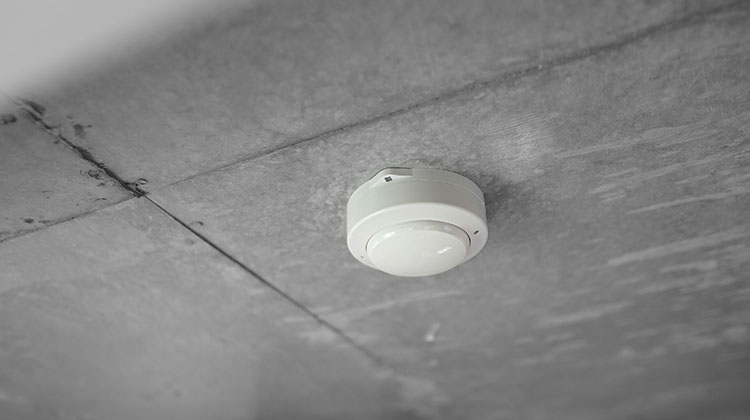A smoke detector is essential for keeping your family secure and safe. The top fire alarms are equipped with a variety of features, and some respond faster to fires than others. That’s significant because each second is a chance to save lives. After evaluating hundreds of models to determine the top smoke detectors suitable for residences, I tested the smoke from a house fire to make sure I chose only the most reliable models. Below are five of my best smart smoke detectors.
4 Best Smart Smoke Detectors
After several days of testing, it was evident which is the best smoke detector for 2025: the Kidde intelligent smoke detector that blends the impressive testing of our earlier Kidde devices, with brand new features…but does not require an app if you prefer not to use it.
I have also compiled a list of the best smart smoke detectors 2025 available for Nest customers, Ring fans, home security, and a lot more. Take a look at the complete list.
1. X-Sense Smart Smoke/Carbon Monoxide Detector Combo
Similar to Nest Protect, the X-Sense Smart Smoke & Carbon Monoxide Detector will trigger all of its alarms when one of them detects danger. They’re also powered by batteries, which means you can install them in any space you’d like to. Additionally, you can get five alarms for less than 200 dollars, meaning you can affordably cover a large portion of your home.
But, none of X-Sense’s smart smoke detectors have the option of being hardwired, which means they might not work with modern constructions that require at minimum 1 alarm to be wired.
Pros
- Sends real-time alerts via mobile app
- Affordable multi-pack for whole-home coverage
- Dual sensors for accurate smoke & CO detection
- Easy setup with a user-friendly app
- Optional professional monitoring service
Cons
- Limited smart home integration (no Alexa/Google)
- Requires a base station for full smart features
- Works only with 2.4 GHz Wi-Fi
- Possible connection issues in larger homes
- App notifications may sometimes be delayed
Also read: How to Choose the Best Home Theatre Power Manager: 2025 Buying Guide
2. Kidde Smart Smoke Detector
Through our testing, we observed Kidde smoke detectors perform exceptionally good in quick smoke detection. This model is equipped with Kidde’s superior photoelectric sensor, which is designed to block out fake fire signs, such as smoke that comes from cooking. It’s also reasonably priced at $55, and sales bring this price lower.
We also picked this model as the best smart smoke detector because it has useful features and also the possibility to make use of app alerts. However, it is not a necessity. It is possible to use LED indicators, voice alarms, and the 85 decibel alarm if you want to. You can also enable Wi-Fi alerts for fire, smoke or carbon monoxide, and also connect to voice assistants and platforms such as Alexa, Google Home or the Kidde app.
Pros
- Very fast alerts in testing
- Smart sensor design reduces false alarms (e.g., cooking smoke)
- Voice alarms + loud siren
- Works with or without Wi-Fi
- Supports Alexa and Google Home
Cons
- No carbon monoxide detection
3. Google Nest Protect
We have a great opinion of this Google Nest Protect detector in our tests. However, there’s a flaw. Google has officially ended support for Nest Protect, and while support is expected to be available for a long time but we’re not confident in recommending it for this particular list. But, there’s an alternative: the brand New partnership that has been formed between Nest with First Alert, leading to the recently released First Alert smoke and carbon monoxide alarms that include Nest Protect.
The battery detector is able to be put in almost any location and comes with full support for Google Home and First Alert’s own application. First Alert is another company that has been very successful during our tests. This model enhances the powerful sensors by incorporating voice alerts, low battery app alerts, and technology to minimize false alarms.
Pros
- Full Google Nest smart home integration
- Dual sensors detect both smoke and carbon monoxide
- Battery-powered design allows flexible placement
- Multiple app alert options for real-time updates
- Sensors engineered to reduce false alarms
Cons
- Battery-only alarm may not meet code in areas requiring hardwired units
- Expensive price $130
4. Ring Alarm Smoke & CO Listener/Detector
Due to a recent alliance in partnership with Ring, Kidde is now also selling smart thermostats specifically made to integrate with the Ring application. They can be integrated into the security system of Ring. However, you don’t require one to use this smart smoke detector. We also love Ring’s UI and the alerts it sends out better than Kidde’s application, which is a good score of usability, too.
The model is a combination of Kidde’s highly scored sensors and Ring technology, which can support various notifications and alerts that are real-time to keep you informed wherever you are. Additionally, there’s a Ring plan that you can purchase that is specifically designed for professional fire response if you’re not averse to the subscription cost.
Pros
- Built-in Ring and Alexa compatibility
- Phone alerts for smoke, low battery, and more
- End-of-life warning alerts
- Clear voice alerts
- Available in both hardwired and battery models
Cons
- No Google Home support
Also read: Best AirTag for Android: 4 Smart Trackers to Keep Your Items Safe
Important Factors When Choosing a Smoke Detector
When selecting a smart smoke detector for your home, consider these key factors to make the right choice:
1. Type of Detection
- Smoke Only: Basic protection, detects smoke and fire.
- Smoke + Carbon Monoxide (CO): Dual-function detectors offer better safety and save space.
2. Sensor Technology
- Photoelectric Sensors: Better at detecting slow, smoldering fires.
- Ionization Sensors: Faster at detecting fast-flaming fires.
- Dual-Sensor Models: Offer both types for full coverage.
3. Power Source
- Battery-Powered: Easy to install anywhere, but batteries need replacement.
- Hardwired: Connect directly to your home’s electrical system (may be required by building codes).
- Battery: Hardwired Combo – Provides backup in case of power outages.
4. Smart Features
- Mobile app alerts for smoke, CO, and low battery.
- Integration with smart home systems (Alexa, Google, Ring, Nest).
- Voice alerts in addition to sirens.
5. False Alarm Prevention
- Look for detectors designed to reduce false alarms from cooking or steam.
6. Ease of Installation & Maintenance
- Some models are simple DIY installs, while others may need professional setup.
- Consider features like “end-of-life” alerts and test/silence buttons via app.
7. Price & Value
- Basic smart smoke detectors start at $50–70.
- Premium models with dual sensors and smart integration can cost $100+.
8. Regulations & Safety Codes
- Some states require hardwired alarms in certain areas.
- Check your local building codes before buying.
Wrapping Up
After our last round of testing, we conducted an extensive review of our selection and replaced nearly every item with brand-new models. This has allowed us to include significant advancements in smoke detectors, such as the recent partnerships with Kidde and Ring, Nest, along First Alert, which herald the dawn of a new age in smart smoke detectors for homes.















Leave a comment